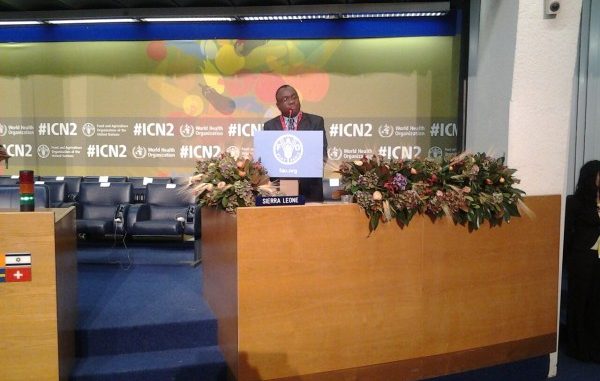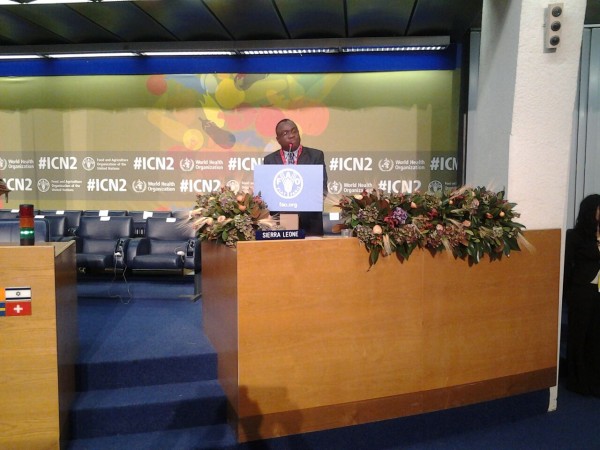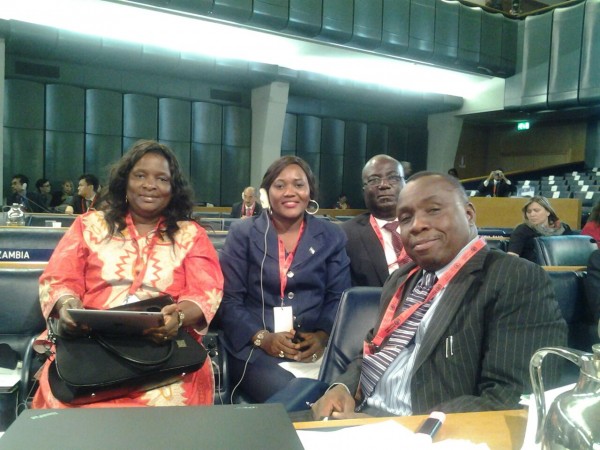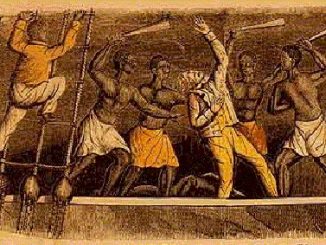
By Umaru S. Jah :
The deputy Minister of Health and Sanitation, Hon. Foday Sawi Lahai has registered his resentment over what he described as ‘the way Ebola is being portrayed outside the country.’
It is true that the country is faced with serious public health emergency as a result of the outbreak but how it is being portrayed outside left much to be desired.
The Minister was speaking at the Second International Conference on Nutrition (ICN2) jointly organised by the Food and Agriculture Organization (FAO) and the World Health Organization (WHO) in the Roman capital of Italy.
“Needless to say that stigmatization is not helping our efforts either, what we need is support to address this world enemy as this is not just a West African problem,” the Minister noted.
He said Sierra Leone was busy accelerating its efforts in tackling malnutrition, food insecurity, poverty alleviation, anti-development and economic growth scourges when the killer disease struck. As a result, it has diverted the country’s focus in fast tracking development growth.
While thanking respective countries and organisations for their unflinching support in the fight against the disease, the Hon. Minister called for more help from international partners to help contain the plague.
The Minister was accompanied by the Dep. Min of Agric & Food Security, Mrs Marie Jalloh, Hon. Rosaline Smith, Sierra Leone’s Permanent Representative to the UN in Rome, Ambassador Jongopie S. Stevens, Deputy Chief Medical Officer, Ms Sarian Kamara and Director of Nutrition, Ms Ami Shamit Koroma.
Read full speech of the Minister bellow…..
Statement by the Deputy Minister of Health and Sanitation, Sierra Leone for the International Conference on Nutrition 2 Meeting in Rome 19th – 21st November 2014
SPEAKER: Foday Sawi Lahai, Deputy Minister, Health & Sanitation. Sierra Leone
Your Royal Majesties, His Excellences, Heads of Delegations and Ministers of Government, Executive Directors of the UN and UN Agencies, UN Partners, Civil Society Organizations, distinguished ladies and gentlemen, it is with great pleasure and a privilege to be associated with such a laudable global conference that seeks to promote nutrition as a crucial priority for social development and economic growth.
The Government of Sierra Leone recognises the negative impacts of malnutrition and food insecurity and its consequences including high maternal and child morbidity and mortality rates, low productivity, poverty and others associated with the malnutrition and food insecurity scourge.
Government is therefore determined to tackle the problems heads on. As a demonstration of the Government’s commitment, the Scaling Up Nutrition (SUN) Movement was launched in 2012 and has since established the Secretariat to undertake the facilitation and coordination of the national efforts under the office of the Vice President.
Mr. Chairman, distinguished ladies and gentlemen I am delighted to say that Sierra Leone has already developed a five year costed nutrition and food security multi-sectoral implementation plan (2012-2017). This is a key policy document expected to facilitate the effective implementation of the Scaling Up Nutrition Initiative through extensive collaboration and systematic coordination among the relevant government line Ministries, UN agencies, Civil Society Groups, NGOs, the Private Sector and donors.
In view of this our Government has been focusing on evidence based direct nutrition and nutrition-sensitive interventions. Key among these include:
- Promoting optimal feeding and caring practices, with specific reference to breastfeeding and appropriate complementary feeding;
- Promotion of diversified food production and adequate consumption of local nutritious foods.
- Supporting adequate intake of vitamins and minerals through both supplements and fortification;
- Prevention and treatment of moderate and severe malnutrition;
- Advocating the improvement of maternal nutrition and
- Ensuring strengthened nutrition surveillance to save the lives of vulnerable women and children
7. Mainstreaming nutrition indicators into the CAADP investment Plan to capture nutrition sensitive aspects of food security and nutrition in the Ministry of Agriculture.
8. Main streaming food and nutrition security and the right to food into the Smallholder Commercialization programme.
9. Government is in the process of incorporating Food and Nutrition security and Right to Food into the curricula of relevant University courses.
These and many others are the strides Government has been making to confront the malnutrition and food insecurity menace in the country.
To enable us track our set out targets, we have established various benchmarks along the way to guide and enhance the realization of our set objectives by 2017, and I am happy to say that they are in line with the World Health Assembly (WHA) global targets for 2025.
With these arrangements Sierra Leone was fully set to make major strides based on our solid foundation for scaling up high impact nutrition and food security interventions. Already by 2014: amongst others we have reduced underfives stunting from 34.1% in 2010 to 28.8% in 2014 , wasting reduced from 6.9% in 2010 to 4.7 % in 2014, underweight from 18.7% in 2010 to 12.8 % in 2014 and exclusive breastfeeding rate has increased from 32 % in 2010 to 58.8% in 2014 amongst children under 6 months.
Unfortunately, it is at this point of fast tracking our interventions in tackling malnutrition, food insecurity, poverty alleviation, and anti-development and economic growth scourges that the virulent Ebola virus struck against our country. This has greatly affected our forward movement as a nation as we refocus all our efforts to get this scourge behind us. And we sure will. We continue to ask our traditional and non-traditional friends to avail us the much needed assistance to tackle this obnoxious virus.
May I kindly use this opportunity to say that it is not as bad inside as it is being portrayed outside; needless to say that the stigmatization is not helping our efforts either. What we need is support to address this world enemy not stigmatization as this is not just a West African problem. But we have not been left all on our own to fight this Ebola war. We would therefore like to take this opportunity to profusely thank those institutions and countries that have stood by us during this very difficult period of our history.
In this august gathering we have come together to:
- Review progress made since the 1992 ICN including country level achievements in scaling up nutrition through direct food and nutrition interventions as well as food and nutrition-enhancing policies and programmes;
- Review relevant policies and institutions on agriculture, fisheries, health, trade, consumption and social protection to improve nutrition;
- Strengthen institutional policy coherence and coordination to improve food security and nutrition, as well as mobilize resources needed to improve nutrition and food security;
- Strengthen international, including inter-governmental cooperation, to enhance food security and nutrition everywhere, especially in developing countries.
Mr. Chairman, distinguished delegates, ladies and gentlemen, in spite of our current difficulties the Government of Sierra Leone is determined to incorporate the goals and aspirations of this conference as presented and adopted by way of greater teamwork, unflinching commitment and systematic resilience with all that is in our power to achieve the expected goals. We want to assure all our partner institutions and Government that we are committed to these global and national strategies to address malnutrition in all its forms and to conquer the negative consequences among our population.
We will continue to maintain a steady effort in our drive to improve and sustain food security, improve health and nutritional status of our population in general, but in particular the women and children in in line with prescribed national and international standards. We shall get there.
I thank you all for your attention.






Leave a Reply